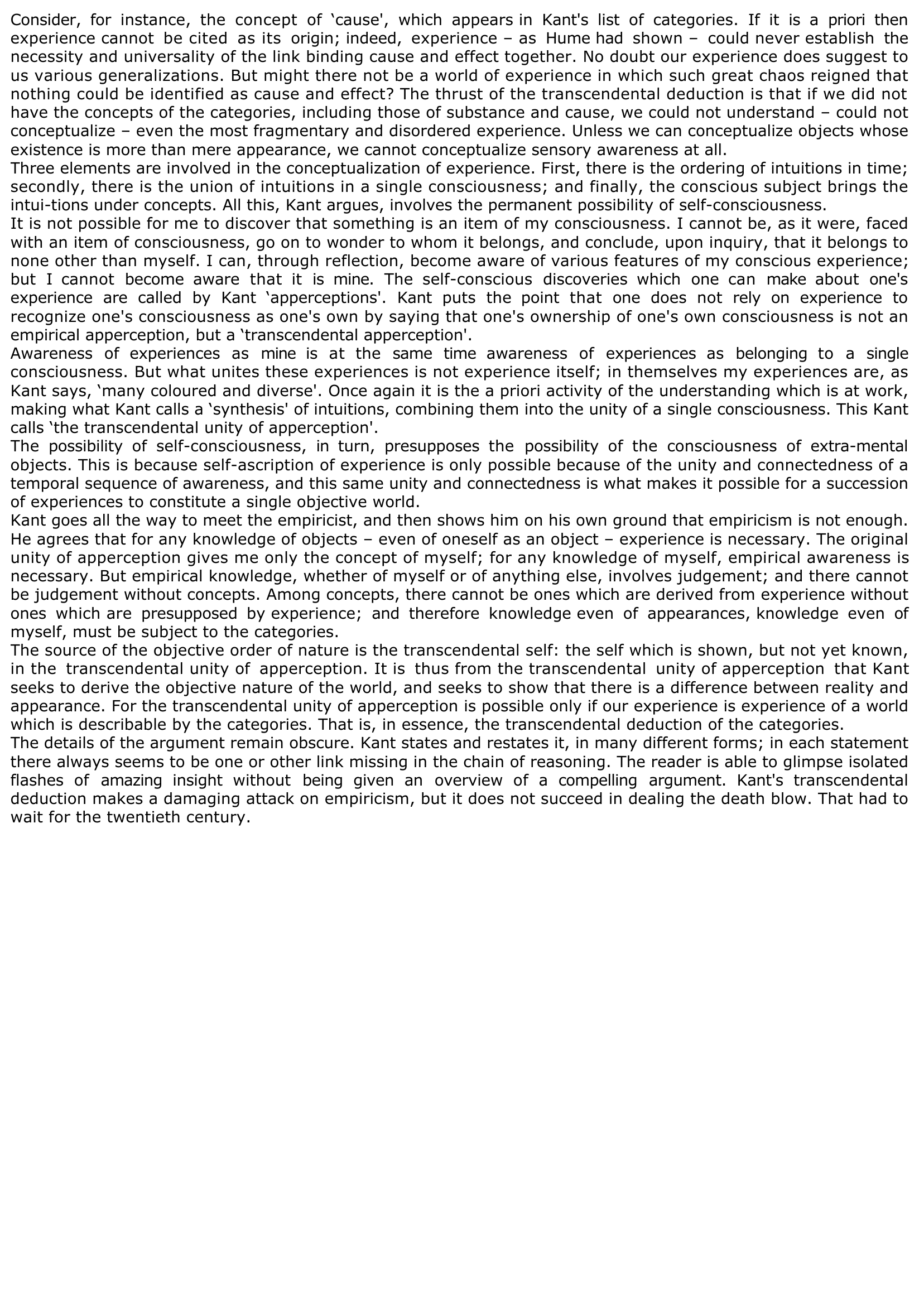THE TRANSCENDENTAL ANALYTIC: THE DEDUCTION OF THE CATEGORIES -KANT
Publié le 09/01/2010
Extrait du document

The transcendental aesthetic is followed in Kant's system by the transcendental logic, which is the study of the understanding, the creative part of the mind. It is the understanding that makes the objects of sensible awareness into objects of thought. Understanding and sense are equal and interdependent. ‘Without the senses no object would be given to us, without understanding no object would be thought. Thoughts without content are empty, awareness without concepts is blind. . . . The understanding is aware of nothing, the senses can think nothing. Only through their union can knowledge arise.' By ‘logic' Kant means the rules by which the understanding operates. He is interested not in the methodology of particular sciences, but in the ‘absolutely necessary rules of thought without which there can be no employment whatsoever of the understanding'. The pure logic which is his concern treats only of the form and not of the content of thought. It is distinct from, and independent of, psychology; it has no interest in the origin or history of our thoughts.

«
Consider, for instance, the concept of ‘cause', which appears in Kant's list of categories.
If it is a priori thenexperience cannot be cited as its origin; indeed, experience – as Hume had shown – could never establish thenecessity and universality of the link binding cause and effect together.
No doubt our experience does suggest tous various generalizations.
But might there not be a world of experience in which such great chaos reigned thatnothing could be identified as cause and effect? The thrust of the transcendental deduction is that if we did nothave the concepts of the categories, including those of substance and cause, we could not understand – could notconceptualize – even the most fragmentary and disordered experience.
Unless we can conceptualize objects whoseexistence is more than mere appearance, we cannot conceptualize sensory awareness at all.Three elements are involved in the conceptualization of experience.
First, there is the ordering of intuitions in time;secondly, there is the union of intuitions in a single consciousness; and finally, the conscious subject brings theintui-tions under concepts.
All this, Kant argues, involves the permanent possibility of self-consciousness.It is not possible for me to discover that something is an item of my consciousness.
I cannot be, as it were, facedwith an item of consciousness, go on to wonder to whom it belongs, and conclude, upon inquiry, that it belongs tonone other than myself.
I can, through reflection, become aware of various features of my conscious experience;but I cannot become aware that it is mine.
The self-conscious discoveries which one can make about one'sexperience are called by Kant ‘apperceptions'.
Kant puts the point that one does not rely on experience torecognize one's consciousness as one's own by saying that one's ownership of one's own consciousness is not anempirical apperception, but a ‘transcendental apperception'.Awareness of experiences as mine is at the same time awareness of experiences as belonging to a singleconsciousness.
But what unites these experiences is not experience itself; in themselves my experiences are, asKant says, ‘many coloured and diverse'.
Once again it is the a priori activity of the understanding which is at work,making what Kant calls a ‘synthesis' of intuitions, combining them into the unity of a single consciousness.
This Kantcalls ‘the transcendental unity of apperception'.The possibility of self-consciousness, in turn, presupposes the possibility of the consciousness of extra-mentalobjects.
This is because self-ascription of experience is only possible because of the unity and connectedness of atemporal sequence of awareness, and this same unity and connectedness is what makes it possible for a successionof experiences to constitute a single objective world.Kant goes all the way to meet the empiricist, and then shows him on his own ground that empiricism is not enough.He agrees that for any knowledge of objects – even of oneself as an object – experience is necessary.
The originalunity of apperception gives me only the concept of myself; for any knowledge of myself, empirical awareness isnecessary.
But empirical knowledge, whether of myself or of anything else, involves judgement; and there cannotbe judgement without concepts.
Among concepts, there cannot be ones which are derived from experience withoutones which are presupposed by experience; and therefore knowledge even of appearances, knowledge even ofmyself, must be subject to the categories.The source of the objective order of nature is the transcendental self: the self which is shown, but not yet known,in the transcendental unity of apperception.
It is thus from the transcendental unity of apperception that Kantseeks to derive the objective nature of the world, and seeks to show that there is a difference between reality andappearance.
For the transcendental unity of apperception is possible only if our experience is experience of a worldwhich is describable by the categories.
That is, in essence, the transcendental deduction of the categories.The details of the argument remain obscure.
Kant states and restates it, in many different forms; in each statementthere always seems to be one or other link missing in the chain of reasoning.
The reader is able to glimpse isolatedflashes of amazing insight without being given an overview of a compelling argument.
Kant's transcendentaldeduction makes a damaging attack on empiricism, but it does not succeed in dealing the death blow.
That had towait for the twentieth century..
»
↓↓↓ APERÇU DU DOCUMENT ↓↓↓
Liens utiles
- THE TRANSCENDENTAL ANALYTIC: THE SYSTEM OF PRINCIPLES - KANT
- THE TRANSCENDENTAL DIALECTIC: THE CRITIQUE OF NATURAL THEOLOGY - KANT
- Encyclopedia of Philosophy: THE TRANSCENDENTAL DIALECTIC: THE ANTINOMIES OF PURE REASON - KANT
- THE TRANSCENDENTAL DIALECTIC: THE PARALOGISMS OF PURE REASON - KANT
- THE TRANSCENDENTAL AESTHETIC -KANT

































